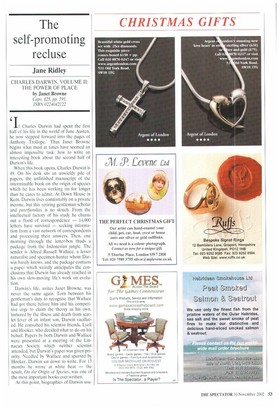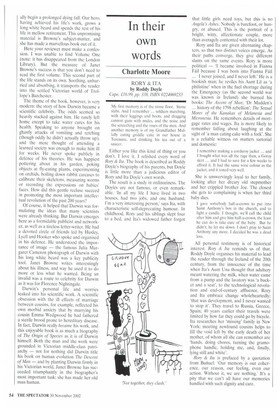self-promoting recluse
Jane Ridley
CHARLES DARWIN, VOLUME II: THE POWER OF PLACE by Janet Browne Cape, £25, pp. 591. ISBN 0224042122 If Charles Darwin had spent the first half of his life in the world of Jane Austen. he now stepped forward into the pages of Anthony Tro'lope,' Thus Janet Browne begins what must at times have seemed an almost impossible task: how to write an interesting book about the second half of Darwin's life.
When this book opens, Charles Darwin is 49. On his desk sits an unwieldy pile of papers, the unfinished manuscript of the interminable book on the origin of species which he has been working on for longer than he cares to admit. At Down House in Kent. Darwin lives comfortably on a private income, but this retiring gentleman scholar and patelfamilias is no slouch. From the intellectual factory of his study he churns out a flood of correspondence — 14,000 letters have survived — seeking information from a vast network of correspondents and processing their answers. Then, one morning through the letter-box thuds a package from the Indonesian jungle. The sender is Alfred Russell Wallace, a lesser naturalist and specimen-hunter whom Darwin barely knows, and the package contains a paper which weirdly anticipates the conclusions that Darwin has already reached in his own slow-moving life's work on evolution.
Darwin's life. writes Janet Browne, was never the same again. Torn between his gentleman's duty to recognise that Wallace had got there before him and his competitive urge to claim the theory as his own, tortured by the illness and death from scarlet fever of an infant son, Darwin vacillated. He consulted his scientist friends, Lyell and Hooker, who decided what to do on his behalf. Papers by both Darwin and Wallace were presented at a meeting of the Linnaean Society which neither scientist attended, but Darwin's paper was given priority. Needled by Wallace and spurred by Hooker, Darwin sat down to write. For 13 months he wrote at white heat — the result, On the Origin of Species, was one of the most important books ever written.
At this point, biographies of Darwin usu ally begin a prolonged dying fall. Our hero, having achieved his life's work, grows a long white beard and spends the rest of his life in mellow retirement. This unpromising material is Browne's subject-matter, and she has made a marvellous book out of it.
Here your reviewer must make a confession. I was unable to find Volume One (note: it has disappeared from the London Library). But the measure of Janet Browne's success is that you don't need to read the first volume. This second part of the life stands on its own. Soothing, unhurried and absorbing, it transports the reader into the settled Victorian world of Trollope's Barchester.
The theme of the book, however, is very modern: the story of how Darwin became a scientific celebrity. The odds seemed so heavily stacked against him. He rarely left home except to take water cures for his health. Speaking to anyone brought on ghastly attacks of vomiting and retching (though oddly he didn't actually throw up), and the mere thought of attending a learned society was enough to make him ill for weeks. He never spoke publicly in defence of his theories. He was happiest pottering about in his garden, poking objects at fly-eating plants, experimenting on orchids, boiling down rabbit carcases to calibrate their skeletons, measuring worms or recording the expressions on babies' faces. How did this gentle recluse succeed in promoting the most important intellectual revolution of the past 200 years?
Of course, it helped that Darwin was formulating the ideas that many scientists were already thinking. But Darwin emerges here as a formidable publicist and networker, as well as a tireless letter-writer. He had a devoted circle of friends led by Huxley, Lyell and Hooker who spoke and organised in his defence. He understood the importance of image — the famous Julia Margaret Cameron photograph of Darwin with his long white beard was a key publicity tool. Janet Browne writes interestingly about his illness, and way he used it to do more or less what he wanted. Being an invalid was a route to celebrity for Darwin as it was for Florence Nightingale.
Darwin's personal life and worries leaked into his scientific work. A scientific obsession with the ill effects of marriage between cousins, for example, reflected his own morbid anxiety that by marrying his cousin Emma Wedgwood he had fathered a sterile brood prone to hereditary disease. In fact, Darwin really became his work, and this enjoyable book is as much a biography of The Origin of Species as it is of Darwin himself. Both the man and the work were grounded in Victorian middle-class patriarchy — not for nothing did Darwin title his book on human evolution The Descent of Man — and by planting Darwin firmly in his Victorian world, Janet Browne has succeeded triumphantly in the biographer's most important task: she has made her old man human.



























































































 Previous page
Previous page